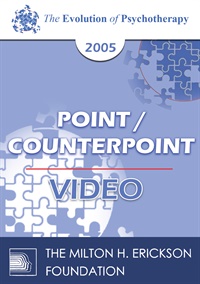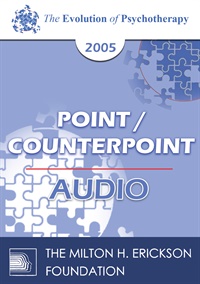
- Average Rating:
- Not yet rated
- Topic Areas:
- Point/Counterpoint Sessions | Divorce | Couples Therapy | Marriage | Psychotherapy
- Categories:
- Evolution of Psychotherapy | Evolution of Psychotherapy 2005
- Faculty:
- John Gottman, PhD | Julie Gottman, PhD | Cloe Madanes, HDL, LIC
- Duration:
- 1 Hour 19 Minutes
- Format:
- Audio Only
- Original Program Date:
- Dec 08, 2005
- Short Description:
- The Gottmans will review research that shows that when the first baby arrives, up to 67% of couples go through a tragic deterioration in the quality of their relationship, which usually begins the cascade toward divorce. Their research outlines the consistent phenomena in this transition, and how the minority of marriages do manage to succeed in avoiding this tragedy. The Gottmans will describe a new approach to the problem and present the results of randomized clinical trial preventative intervention with one-year follow-up data on that intervention.
- Price:
- $15.00 - Base Price
- Average Rating:
- Not yet rated
- Topic Areas:
- Point/Counterpoint Sessions | Narcissism | Personality Disorders | Psychotherapy
- Categories:
- Evolution of Psychotherapy | Evolution of Psychotherapy 2005
- Faculty:
- Otto Kernberg, MD | James F. Masterson, MD
- Course Levels:
- Master Degree or Higher in Health-Related Field
- Duration:
- 1:18:56
- Format:
- Audio and Video
- Original Program Date:
- Dec 08, 2005
- Short Description:
- Indications and contraindications for supportive and psychodynamic approaches to pathological narcissism will be outlined. Essential techniques of these modalities for narcissistic patients will be described, and alternative approaches examined.
- Price:
-
Sale is $29.00
price reduced from Base Price - $59.00

- Average Rating:
- Not yet rated
- Topic Areas:
- Point/Counterpoint Sessions | Neurobiology | Object Relations Theory | Psychotherapy | Attachment | History of Psychotherapy
- Categories:
- Evolution of Psychotherapy | Evolution of Psychotherapy 2005
- Faculty:
- James F. Masterson, MD | Erving Polster, PhD
- Duration:
- 1 Hour 18 Minutes
- Format:
- Audio Only
- Original Program Date:
- Dec 10, 2005
- Short Description:
- This talk first briefly reviews the history of the Developmental, Self and Object Relations theoretical approach to the personality disorders as a preface to exploring the latest additions to the theory, i.e., Attachment Theory and Neurobiological Development of the Self in the Right Brain. Attachment Theory: The work of Ainsworth and others is described leading to the attachment categories in the infant and the adult. Many follow-up studies are presented validating the persistence of the categories over time. Neurobiologic Development of the Self in the Right Brain: The work of Alan Schore, Ph.D. is used to describe the development of the self in the right prefrontal cortex of the brain. Integration: The integration of the two theories with the object relations approach are described and illustrated through therapeutic alliance
- Price:
- $15.00 - Base Price
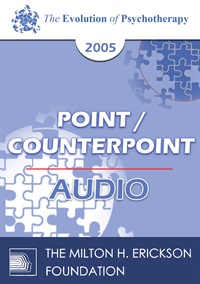
- Average Rating:
- Not yet rated
- Topic Areas:
- Point/Counterpoint Sessions | Hypnosis | Phenomenology | Psychotherapy
- Categories:
- Evolution of Psychotherapy | Evolution of Psychotherapy 2005
- Faculty:
- Jeffrey Zeig, PhD | Marsha Linehan, PhD
- Duration:
- 1 Hour 19 Minutes
- Format:
- Audio Only
- Original Program Date:
- Dec 10, 2005
- Short Description:
- Hypnosis is commonly thought of as a tool to enhance the therapy. It also can be used as a "lens." The phenomenology of hypnosis can help us to understand an essential aspect of the trance state, the symptom state, the solution state and the therapist's state, thereby providing new options for treatment.
- Price:
- $15.00 - Base Price
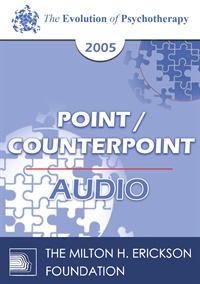
- Average Rating:
- Not yet rated
- Topic Areas:
- Point/Counterpoint Sessions | Law & Ethics | Psychotherapy
- Categories:
- Evolution of Psychotherapy | Evolution of Psychotherapy 2005
- Faculty:
- Thomas Szasz, MD | James Hillman, PhD
- Duration:
- 1 Hour 19 Minutes
- Format:
- Audio Only
- Original Program Date:
- Dec 10, 2005
- Short Description:
- Analysis of the problematic nature of the concepts of mental illness and psychological (verbal) therapy. How psychotherapists influence persons. Examination of the economic, ethical and legal aspects of psychotherapy.
- Price:
- $15.00 - Base Price
Tags: Ethics Law Psychotherapy Thomas Szasz
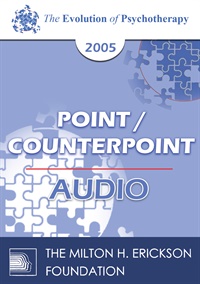
- Average Rating:
- Not yet rated
- Topic Areas:
- Point/Counterpoint Sessions | Psychotherapy | Therapist Development
- Categories:
- Evolution of Psychotherapy | Evolution of Psychotherapy 2005
- Faculty:
- James Hillman, PhD | Donald Meichenbaum, PhD
- Duration:
- 1 Hour 19 Minutes
- Format:
- Audio Only
- Original Program Date:
- Dec 10, 2005
- Short Description:
- The client comes for help because he/she is "deeply" troubled. These "deeps" lurking inside problems need to be spoken about by the client and spoken to by the therapist/counselor. Otherwise practice fails its promise and becomes a bag of tricks for fixing problems.
- Price:
- $15.00 - Base Price
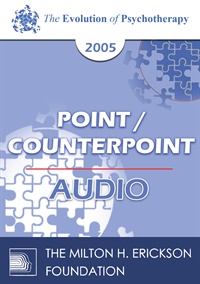
- Average Rating:
- Not yet rated
- Topic Areas:
- Point/Counterpoint Sessions | Anxiety | Psychotherapy
- Categories:
- Evolution of Psychotherapy | Evolution of Psychotherapy 2005
- Faculty:
- Marsha Linehan, PhD | Arnold Lazarus, Ph.D.
- Duration:
- 1 Hour 19 Minutes
- Format:
- Audio Only
- Original Program Date:
- Dec 10, 2005
- Short Description:
- Effective exposure based treatments work via cue exposure, response prevention, and reinforced "opposite action" (all the way). The principles of exposure treatments for anxiety disorders can be generalized to treat disorders of other emotions such as anger, sadness, jealousy, envy, shame and guilt. Opposite action can be taught as a skill.
- Price:
- $15.00 - Base Price
Tags: Anxiety Psychotherapy
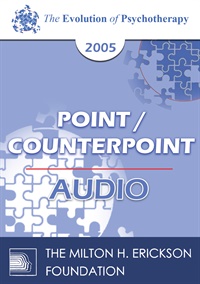
- Average Rating:
- Not yet rated
- Topic Areas:
- Point/Counterpoint Sessions | Aging and Mortality | Psychotherapy | Family Therapy
- Categories:
- Evolution of Psychotherapy | Evolution of Psychotherapy 2005
- Faculty:
- Mary Goulding, MSW | Salvador Minuchin, MD
- Duration:
- 1 Hour 19 Minutes
- Format:
- Audio Only
- Original Program Date:
- Dec 10, 2005
- Short Description:
- The emotional problems, physical impairments, financial difficulties and, especially, how does someone nearing death cope with the belief that the world has become so much less caring and altruistic than it was in much of the previous century.
- Price:
- $15.00 - Base Price
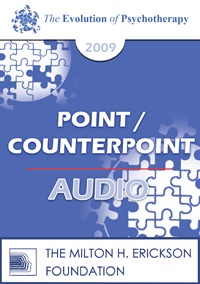
- Average Rating:
- Not yet rated
- Topic Areas:
- Point/Counterpoint Sessions | Psychotherapy | Therapist Development
- Categories:
- Evolution of Psychotherapy | Evolution of Psychotherapy 2009
- Faculty:
- Donald Meichenbaum, PhD
- Duration:
- 1 Hour 23 Minutes
- Format:
- Audio Only
- Original Program Date:
- Dec 09, 2009
- Short Description:
- A major challenge for any skills-oriented intervention is the issue of treatment generalization. Psychotherapists cannot just “train and hope” for transfer. In this presentation, Dr. Meichenbaum will discuss and demonstrate what needs to be done before, during and after interventions to make them more effective. He will discuss specific steps that psychotherapists should take to increase the likelihood of maintenance and generalization across settings and across response domains.
- Price:
- $15.00 - Base Price
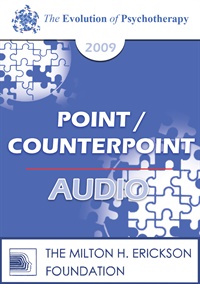
- Average Rating:
- Not yet rated
- Topic Areas:
- Point/Counterpoint Sessions | Trauma | Eye Movement Desensitization and Reprocessing (EMDR) | Psychotherapy
- Categories:
- Evolution of Psychotherapy | Evolution of Psychotherapy 2009
- Faculty:
- Francine Shapiro, PhD
- Duration:
- 1 Hour 8 Minutes
- Format:
- Audio Only
- Original Program Date:
- Dec 09, 2009
- Short Description:
- EMDR has been used worldwide over the past decade as an empirically validated trauma treatment. During that time, it has become clear that it is possible to simultaneously alleviate suffering, help stop the cycle of violence, and address the devastating effects of trans-generational transmission. The clinical implications for simple symptom reduction versus personal growth and resiliency will be explored.
- Price:
- $15.00 - Base Price
Please wait ...


